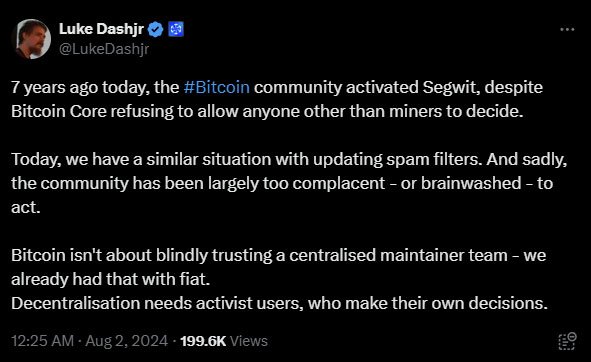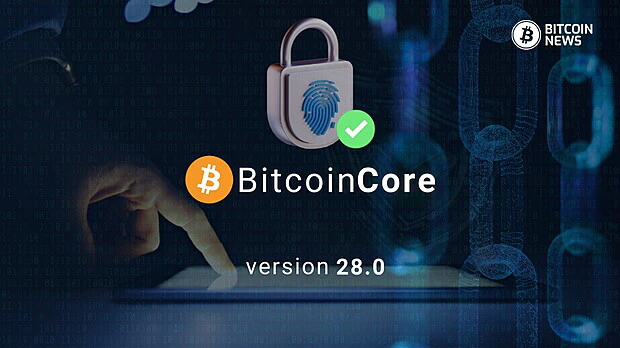The Bitcoin development team has rolled out Bitcoin Core v28.0, the latest version of its core software. This update is a critical improvement for the Bitcoin network, offering enhanced security features, privacy updates, and several bug fixes.
Bitcoin Core, which serves as the backbone of the Bitcoin network, plays a key role in maintaining the decentralization and security of the ecosystem. This upgrade improves the network’s robustness and decentralization.
One of the most notable features of the Bitcoin Core v28.0 update is its focus on addressing security vulnerabilities.
Last month, Bitcoin developers flagged a high-risk vulnerability that impacted one in every six Bitcoin nodes.
This flaw, present in v24.0.1 and older nodes, made the network susceptible to denial-of-service (DoS) attacks, where malicious actors could overload nodes by spamming them with low-difficulty blockchains.
The new update fixes this vulnerability, reinforcing the network’s defenses against such attacks.
“Bitcoin Core 28.0 has been released! Welcome Testnet4,” said Bitcoin developer Jameson Lopp, highlighting the significance of the new version.
According to Lopp, this version officially launches the 4th version of Bitcoin Testnet network, creating a more robust sandbox for developers.
With this update, Bitcoin’s network becomes more resilient to potential security threats, particularly as the digital asset continues to grow in popularity and adoption worldwide.
Another important feature of the Bitcoin Core software is its open-source nature, allowing reproducible builds. This feature allows experienced users to independently compile software binaries that are identical to the ones available on the official Bitcoin Core website.
Essentially, this boosts transparency and trust within the community, as users can verify that the software they’re using hasn’t been tampered with.
This feature reinforces Bitcoin’s decentralized ethos. Reproducible builds are an important step toward increasing trust in the Bitcoin ecosystem.
The latest version allows up to 125 peer connections by default, with 11 outbound connections. This ensures that users remain fully integrated into the Bitcoin network, helping to maintain its decentralized structure.
While keeping such high number of connections may seem demanding, it is essential for the network’s resilience. The high number of peer connections ensures that Bitcoin users stay connected to the network, thereby contributing to its overall security and decentralization.
Users are encouraged to update to the latest version to take advantage of these features and protections.
Privacy has always been a major concern for Bitcoin users, and the Core 28.0 update makes significant strides in this area as well.
The new privacy features introduced in this version improve how Bitcoin transactions are handled, making them more secure and less prone to being traced.
In this version, full Replace-By-Fee (RBF) is enabled by default, making it more challenging for blockchain analytics and intelligence firms to deanonymize transactions.
Blockchain analytics firms and attackers often use heuristics to track transactions, identifying patterns like “first-seen” transactions (i.e., assuming the first broadcast transaction is the valid one).
By enabling Full RBF, the assumption that the first transaction seen in the network is the final one is no longer reliable. This disrupts common tracing techniques, making it harder to tie specific inputs to outputs and compromising adversarial transaction analysis.
Besides that, users can leverage Full RBF to obscure their actual intentions. For instance, they can initially broadcast a transaction with a low fee to mislead observers about the transaction’s priority or to simulate stalled transaction activity.
They can then replace it with a higher fee and possibly different outputs to prevent chain analysis from confidently identifying their transactions or intentions.
This update is part of the ongoing effort to keep user data private, especially in an era where privacy concerns are at an all-time high.
Bitcoin developer Luke Dashjr previously raised concerns about certain aspects of the update, specifically around community involvement. He stressed that Bitcoin’s decentralized nature depends on active participation from its users.

Dashjr argued that Bitcoin ought to operate independently of a centralized service team, emphasizing that its fundamental nature should be decentralized. He noted the importance of user engagement in maintaining Bitcoin’s original vision of decentralization.
What Dashjr is referring to, is his numerous calls for the developer community to implement a spam filter into the Bitcoin Core software, giving it the ability to filter out NFT transactions that Dashjr and many other Bitcoiners consider to be spam.
They argue that these transactions, like Ordinals and Runes, take up a lot of blockspace, and raise the fees for ordinary bitcoin transactions, while serving no valuable purpose.
Related: Bitcoin Fees Skyrocket | Community Divided on Ordinals
As of version 28 of Bitcoin Core, no such filter has been implemented.
The release of Bitcoin Core 28.0 comes at a time of significant price fluctuations for the digital asset.
In early October, bitcoin experienced strong selling pressure, dropping to $60,000 before rebounding slightly. As of now, bitcoin is trading above the $62,000 level, but there’s widespread speculation about where it might go next.
Market analysts are divided on bitcoin’s future price movements. Some suggest that it might dip to $57,000 before resuming its upward trend, while others believe the digital asset could regain the crucial support zone between $63,000 and $64,000, leading to a potential rally toward $70,000.










